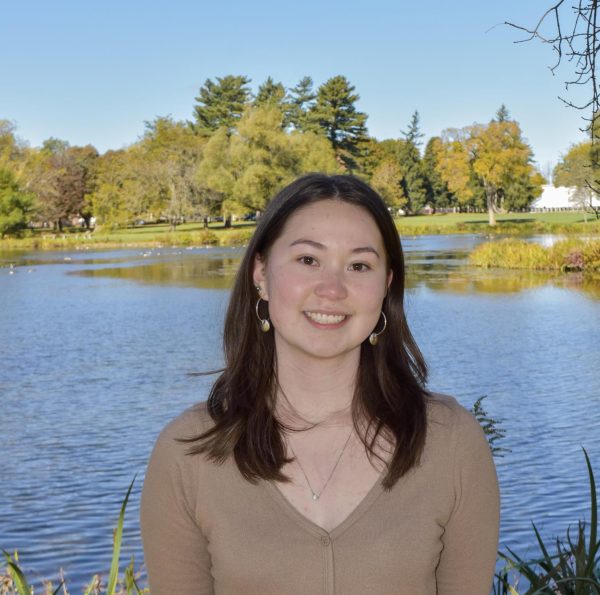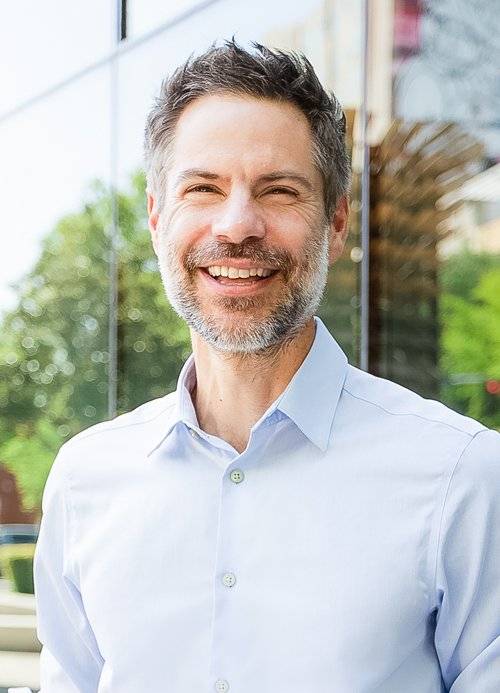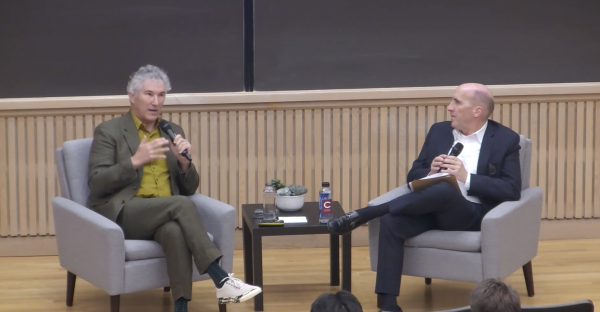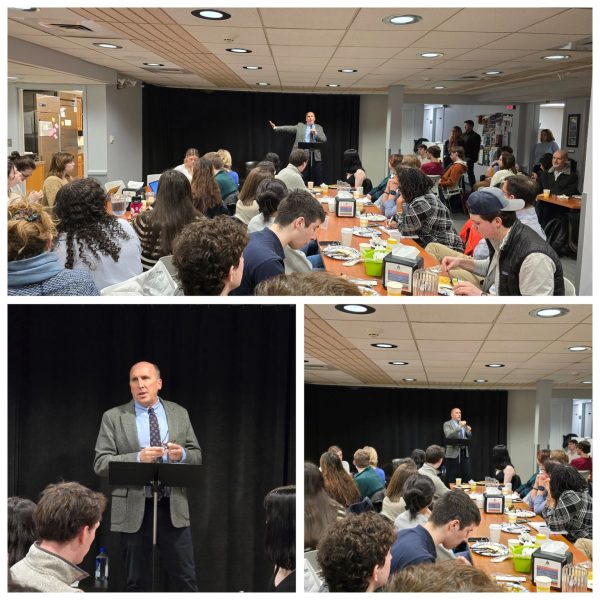Michael Shellenberger Gives Controversial Lecture Discussing Alternative Climate Change Solutions
On Tuesday, Nov. 29, Michael Shellenberger, founder and president of Environmental Progress, co-founder of the Breakthrough Institute and the California Peace Coalition, and former candidate for governor of California, gave a lecture and discussion at Colgate University titled “Climate Change and Sustainable Energy: How Practical is Renewable Energy?” The talk was sponsored by the Center for Freedom and Western Civilization and took place in person at Persson Hall as well as on Zoom for Colgate University alumni. Shellenberger was introduced by Professor Robert Kraynak, Professor of Political Science and Director of the Center for Freedom & Western Civilization.
Kraynak stated that Shellenberger coming to Colgate was because of his reputation as an environmentalist.
“Michael Shellenberger was invited to Colgate by the Center for Freedom because he is known as a courageous voice in the debates about climate change and sustainable energy,” Kraynak said.
Shellenberger began by talking about the effects of climate change such as natural disasters and the increasing frequency of heat waves and proceeded to discuss possible issues, with switching to solar and wind power and becoming vegans or vegetarians being two examples.
Shellenberger then transitioned, saying that global carbon emissions have actually been decreasing for the last decade and very few people die from natural disasters because of improved infrastructure.
“The cost of disasters everywhere is going down…our infrastructure is so much better…we’re so much better prepared,” Shellenberger said.
Shellenberger also criticized graphs from The New York Times and Financial Times about the increased number of hurricanes in recent years, saying they had not taken into account better technology used to track hurricanes.
“[They’re] grossly misleading,” Shellenberger said.
Shellenberger also stated that there is currently more coral on the great barrier reef than in the last 36 years and that the state of California is currently thinning forests with controlled fires because humans are using less paper than before.
Shellenberger believes the cause of ‘climate alarmism’ is the attitude about climate change in everyday people and in the media.
“[It’s the] change in the mental environment of journalists and all of us,” Shellenberger said.
Shellenberger then discussed the future of energy, specifically making a case for nuclear energy.
“If you really care about sustainability, the holy grail is nuclear power,” Shellenberger said.
Kraynak spoke about Shellenberger’s lecture and the ideas shared.
“In his lecture, he challenged the conventional wisdom on two major points: he argued that we are not in danger of imminent collapse or doom because we can adapt, but he also made the case that green energies such as wind, solar, and thermal will not be sufficient to provide for our energy needs,” said Kraynak. “Hence, we will need nuclear power — which is the safest and cleanest type of energy that can provide for the voracious needs of modern industrial society.”
During the Q&A section of the talk, Shellenberger elaborated on his views about recycling plastics that were mentioned in the lecture portion of the talk. He stated that recycled plastics eventually end up in the ocean because recycling companies send their plastics to underdeveloped countries.
“Please stop trying to recycle your plastics,” Shellenberger said.
The Colgate University Director of Sustainability John Pumilio spoke against this claim by Shellenberger.
“Mr. Shellenberger is skillful at selecting isolated facts and certain truths and presenting them as [a] rationale for illogical conclusions,” Pumilio said. “This might lead one to believe, if untrained to think critically and independently, that throwing plastics in the landfill is better than recycling or that solar energy and electric vehicles are impractical solutions for a low-carbon economy.”
Kraynak found Shellenberger’s thoughts important to the conversation around climate change and the environment today.
“Shellenberger sought to inject a note of realism in discussions about sustainability, even pointing out that most recycled plastic bottles wind up being sent to poor countries who simply dump them in the ocean,” said Kraynak “It is better for the environment to put plastic bottles in landfills in America.”
Pumilio, however, criticized other aspects of Shellenberger’s talk.
“I trust that most Colgate students who attended Mr. Shellenburger’s talk recognized that his heretical ideas are at odds with leading science and rational arguments,” Pumilio said. “While improvements can and need to be made in recycling, renewable energy, and electric vehicles, there is no bridge from these and some of the other arguments made by Mr. Shellenberger to his overarching conclusions. I think most Colgate students understand this.”
Kraynak believes that Shellenberger’s talk brought new ideas to the conversation circulating amongst the University community.
“His thoughts and insights were provocative and controversial to the large student audience that attended, and they asked many thoughtful questions about sustainable energy,” Kraynak said. “It was a memorable event for the Colgate community.”
Senior Rebecca Hance was especially upset with Shellenberger’s lecture given her experience as an intern at the Office of Sustainability.
“It felt like he was calling anyone who is rightfully concerned a climate alarmist,” Hance said. “I left the talk frustrated because most of the students I saw in the audience were there for classes outside of environmental studies or in unrelated majors, and so this might be the only time they engage with environmental studies at Colgate.”
Hance also questioned some of the problematic statements and claims made during the lecture, especially regarding climate change-related natural disasters, criticizing their lack of accuracy and presence in a university setting.
“Now, [students are] walking out of this talk with a ton of misleading information,” Hance said.
Some students in attendance at the talk joined Shellenberger and the Department of Political Science professors after the lecture.
“Fifteen students joined Mr. Shellenberger and several political science faculty for dinner afterward, where a lively and engaging discussion of many social policies, from environmentalism to homelessness in American cities, continued for several hours,” Kraynak said.

Samantha Wotring is a senior from Houston, Texas, majoring in English creative writing and history. She has previously served as an Assistant News Editor...








Heretic • Feb 15, 2024 at 11:06 am
It’s revealing that John Pumilio would use a word like ‘heretical’ to refer to Shellenberger’s arguments. That’s the quasi-religious language of someone protecting an environmental dogma, not commited to open debate in an attempt to learn what’s actually working (and what’s not) as we strive to protect our planet.
T.W • Dec 10, 2022 at 9:37 am
He’s correct. You college kids are just too young to realize that climate change is a constant and not the doomsday scenario tactic used to scare the people. We have to offer cheap power to the impoverished to lift up the whole global energy crisis. That’s the only way all humans can better the world and themselves. We need nuclear energy now!